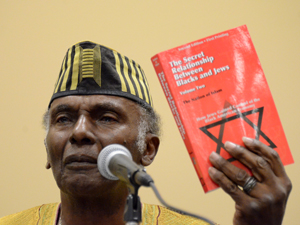Image may be NSFW.
Clik here to view.
Representative Hakeem Jeffries spoke to the Wall Street Journal recently about the influence his uncle Dr. Leonard Jeffries had on him. And the contrast between these two family members and their influence on each other are interesting to observe.
When it comes to their respective ideologies, they also illustrate, to put it in Hegelian terms, a thesis and antithesis within black politics that would do well to be transcended. This aufheben of Rep. Jeffries’ smarmy, wishy-washy centrism and Dr. Jeffries’ quasi-scholarly Afrocentrism would ideally combine Rep. Jeffries’ respect for peer-reviewed, accepted science and history and his belief in pluralism with Dr. Jeffries’ no-holds-barred criticism of institutionalized racism in today’s America and radical rejection of the current ruling order.
Institutionalized white supremacy would tremble at such a synthesis.
But, in true Hegelian fashion, History’s progression, i.e. Spirit’s unfolding, is already working toward the sublation, i.e. the suppression and realization, of Hakeem’s pluralistic centrism and Leonard’s radical black nationalism.
Clik here to view.

Dr. Leonard Jeffries became infamous in the 90s for a lecture in which he claimed “rich Jews” financed the slave trade.
In the interview with the Wall Street Journal, Rep. Jeffries discusses how the controversy surrounding his uncle’s infamously anti-Semitic and quasi-scholarly lecture in Albany during the 1990’s affected and influenced him and his family.
“It had a great impact on my father at the time,” Rep. Jeffries said.
“My father’s a strong person so he never really showed it but that was his brother who was in the midst of the eye of the storm and that was what I remember.”
Rep. Jeffries’ mother was also visibly affected by the controversy. According to the Congressman, his mother tried to “shield” him and his brother from the brouhaha.
“My mother made a very deliberate concerted effort to shield us from a lot of the controversy that took place. She didn’t want us to be distracted from our studies,” Rep. Jeffries said.
“And so when a lot of the controversy took place and my brother and I were away at school. There was no Internet during that era and I can’t even recall a daily newspaper in the Binghamton, N.Y., area but it wasn’t covering the things that the New York Post and Daily News were at the time.”
And though Rep. Jeffries claims to only have “a vague recollection of it,” the controversy surrounding his uncle’s controversial lectures obviously had an affect on him. A child cannot help but notice their parents’ reaction to something, especially when that parental reaction involves the attempt to hide or censor something from the child.
Rep. Jeffries obviously noticed how the hubbub surrounding his uncle affected his parents and learned early that a black man spouting radical or nationalist rhetoric has no chance of gaining power within the current system.
Or as Dr. Jeffries himself said in an interview about President Obama:
“Obama is the President of the United States who happens to be black. Anyone running to be the black President of the United States cannot win.”
Clik here to view.

Rep. Hakeem Jeffries learned early that black nationalistic rhetoric would not get him far in his political career.
Hakeem Jeffries learned early in his career that a politically-correct, left-of-center multiculturalism would do better at making him a Congressman than his uncle’s blunt, anti-establishment black nationalism ever could.
“Throughout the campaign and as a member of Congress, I’ve focused on trying to bring people together around issues of common ground,” Rep. Jeffries said.
And the seeds of the next, necessary historical step can already be seen in Rep. Jeffries. He bravely stands up against the forces of domination and oppression in his fight against stop-and-frisk and very bluntly accuses these police tactics of being racist in practice without recourse to pseudo-history or ethnocentric rhetoric. Rep. Jeffries also consistently and openly speaks and votes for policies that will benefit “the most vulnerable” in our society (e.g. minorities of all kinds, the poor, the young, the elderly). These actions may not be the fully developed and robust sublation of Hakeem and Leonard’s ideologies just yet, but they are smalls signs of what it to come in the next generation of black politics. They are the knockings of that inner Spirit, hidden beneath the surface, that will soon burst forth from the current status quo.
And as surely as Hakeem’s ideology has dialectically developed out of its apparent opposite, i.e. his uncle’s ideology, the supersession of both of their ideologies will inevitably come about as Spirit continues on its journey to fully realize itself at the end of History.